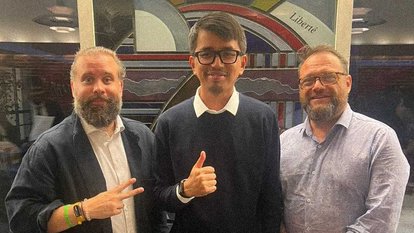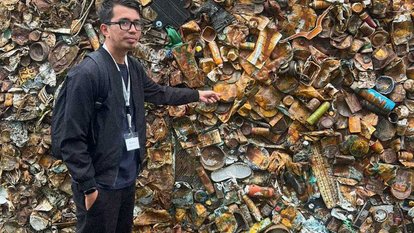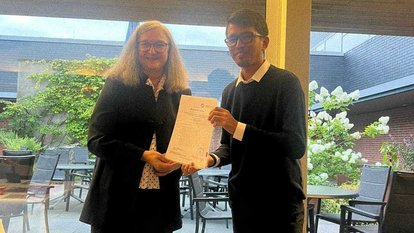IAF
The Greenside of Liberalism: A Path Towards Sustainable Solutions

Rahman Imuda standing next to a signboard of IAF in Gummersbach.
When we think of environmental protection and energy policy, the discourse is often dominated by green parties, with liberals less visibly involved. However, the recent program at the International Academy for Leadership (IAF) in Gummersbach, Germany, titled "The Greenside of Liberalism: Environmental Protection from Climate Change to Energy Policy," sought to address this gap. The program emphasized the crucial role that liberals can and should play in shaping sustainable policies, highlighting that liberal values are not only compatible with environmental stewardship but also essential for its success.
During the workshop, we were tasked with assisting a hypothetical 'Green Minister' in crafting comprehensive environmental and energy policies. This exercise highlighted the complexities and critical discussions necessary when developing solutions to these global challenges. One of the key challenges we encountered was navigating the "prisoner’s dilemmas" inherent in policymaking, where short-term gains could potentially undermine long-term objectives. We quickly realized that the success of any policy depends on incentivizing the right stakeholders and avoiding the pitfalls of unintended consequences, such as the infamous Cobra effect, where poorly designed incentives can exacerbate the problem they were meant to solve.
From a liberal perspective, the most effective way to tackle environmental issues and promote energy transition policies is through market mechanisms. A prime example is the implementation of Carbon Credits, which puts a price on carbon emissions and holds industries accountable for their environmental impact. This market-based approach not only internalizes the cost of pollution but also encourages innovation in green technologies.
However, while I believe that market-based solutions are the best path forward, it is crucial to critically assess the social impact of these market dynamics. We must ensure that vulnerable populations and current workers are not disproportionately affected by the shifts in the market. Issues such as land grabbing and the automation of industries can lead to significant social disruption, displacing communities and causing job losses. It is essential that any market-based solution includes safeguards to protect these groups, ensuring that the transition to a greener economy is just and equitable.
Market solutions alone are not enough. We must also ensure that green technologies are accessible and efficient, making them viable alternatives to carbon-based fuels. The challenge lies in improving the return on investment (ROI) for green technologies so that they can compete with and eventually surpass the current fossil fuel-based systems. This requires targeted support for green startups and fostering an ecosystem that encourages technological advancements.
While industries need to shift from carbon fuels to greener alternatives, there is also a moral imperative for developed countries to take responsibility for their historical emissions.
It is essential to recognize that while developing countries are often criticized for their environmental practices, it is the developed world that has contributed the most to the current crisis.
Energy transition is another critical area that requires attention. While electrification is a significant step forward, it is not the only solution. Alternatives such as hydrogen fuel cells, bioenergy, and advancements in nuclear energy offer diverse pathways to a sustainable future. Each of these technologies presents unique opportunities and challenges, and a balanced energy mix will be crucial to achieving a successful transition.
In addition to developing new energy sources, we must also focus on energy efficiency. Often overlooked, energy efficiency can drastically reduce the demand for new energy production. One method to achieve this is through Pinch Analysis, a technique used in industrial processes to minimize energy consumption. By identifying the most efficient ways to use energy within a system, industries can reduce waste and lower their overall carbon footprint, contributing significantly to climate goals.
Addressing climate change is a pressing global issue that demands urgent action. While industries need to shift from carbon fuels to greener alternatives, there is also a moral imperative for developed countries to take responsibility for their historical emissions. Climate justice must be a cornerstone of any global strategy, with developed nations leading the way in knowledge transfer and funding to help developing countries transition to greener economies. It is essential to recognize that while developing countries are often criticized for their environmental practices, it is the developed world that has contributed the most to the current crisis.

Rahman Imuda sitting in one of IAF sessions.
In the Malaysian context, environmental and energy issues often take a backseat to more immediate concerns. My estimation is that 90% of voters are not deeply engaged with these topics, as they tend to surface during periods of economic prosperity rather than in times of hardship. Politicians often focus on issues that resonate more broadly with the electorate, leaving environmental concerns on the periphery. However, I applaud the efforts of Malaysia's NRECC Ministry and their National Energy Transition Roadmap (NETR). This roadmap is a step in the right direction, aiming to balance economic growth with environmental sustainability, and promoting the adoption of renewable energy sources and energy efficiency measures.
Reflecting on my experience at the IAF, I can confidently say that the workshop was invaluable. It not only deepened my understanding of the intersection between liberalism and environmental policy but also provided me with practical insights into the challenges and opportunities we face. The connections I made with fellow participants and experts will undoubtedly prove beneficial in my future endeavors. I look forward to returning to the IAF Academy in the next few years, where such vital discussions continue to shape the future of global policy.
Gallery




